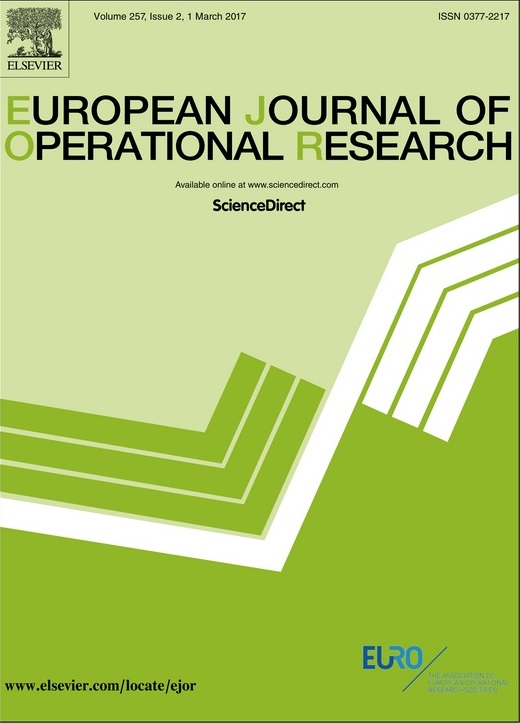Working Groups
EURO working groups (EWG) are communities of researchers interested in a specific Operational Research topic. These groups provide an organisational framework and funding to support the community in promoting and advancing their research area. These Groups are a very important part of EURO’s mission.
Active EURO Working Groups have a meeting at least once a year where the members exchange ideas, experiences and research results, and support each other in research work. In addition to their annual meetings, the groups also have other ways of working; for example they organise sessions in conferences, publish feature issues of the European Journal of Operational Research or other OR journals, and organise conferences or seminars.
Background
The European OR research community has a long tradition in organising working groups on many aspects of Operational Research. The first EURO Working Groups date back to 1975 having been established at EURO I. Many are still active today. Over time, new fields of OR built momentum and a critical mass of researchers resulting in the creation of new Working Groups. Occasionally groups see a drop in interest and close. An account of the early history (up to 1983) can be found in J. Krarup, Profiles of the European Working Groups, EJOR 15 (1984) 13-37. Since 1993, the liaison officer between EURO and the Working Groups is the EURO Vice President 2.
Currently, EURO hosts 33 EWGs, with the last one established in 2023. These facts reveal that the original initiative of EURO to install such an organisational framework has proven to be very successful. A major reason for their success lies with the EURO Working Group co-ordinators. By their personal effort to motivate and organise the activities of their respective Groups, they make a critical contribution to the organisation of special sessions in conferences and/or to the publication of relevant papers in special issues of highly regarded OR-related journals. The success of EWGs can also be attributed to the individual members, many of which find an opportunity to meet on a regular basis. At EWG meetings, they may exchange ideas, experiences and ongoing research results with colleagues interested in the same OR topic before an actual publication is produced. These meetings are also essential to mentoring and supporting researchers new to OR. As a consequence, many fruitful European research partnerships are emerging.
Why not join a EURO Working Group?
Individual members of any EURO member society can benefit from joining a EURO Working Group in several ways: usually the Groups organise regular meetings which provide an excellent means to meet colleagues working in the same field, to exchange ideas and research results, and to find new scientific partners. Through the efforts of the Working Group Coordinators, these meetings take place in a friendly and stimulating atmosphere. By organising special issues in OR-related journals, members of a Working Group have a better and more effective outlet for publicising their ideas and results. Cooperation within the Groups is smooth, and the personal relations among members of the Group can be described best with the word friendship.
If you want to get more information about a EURO Working Group or to join one, contact either the co-ordinator of the Group or the EURO Vice President 2.
How to create a EURO Working Group?
If a group of researchers and/or practitioners cannot find an established EURO Working Group with the OR topic that interests them, it is possible to submit a proposal for a new EURO Working Group to the EURO Executive Committee.
There are certain requirements that such a group has to meet:
- As far as possible, the EURO Working Groups should bring together people with different professional backgrounds, i.e. researchers, practitioners and OR educators.
- The group should ideally have a European membership. This requirement is met if at least 4 European countries are represented at each meeting, and if the meetings do not take place in the same country too often.
- Any group should be open to any individual member of any EURO member society. Persons that are not members of a national OR society can also be accepted but the coordinators have to belong to a EURO member society.
A research community becoming a EWG brings duties and advantages to the group. One of the advantages is that the Working Group obtains organisational support from EURO. EURO-k conferences provide time and space for the meetings of the Groups, and the meetings can be set within the framework of the conference itself. Another advantage is that a Working Group obtains financial support from EURO. Funding can be granted, for example, to help cover administrative costs in the establishment of a new EURO Working Group, and for seminar/workshop expenses such as the costs of inviting guest speakers or for subsidising students who attend the meeting. One of the duties is that the co-ordinators of the Working Groups have to report yearly on their activities to EURO and account for how the funding has been spent. More details on the organisation and activities of Working Groups are stated in the charter of the EURO Working Groups.
More information about Working Groups can be obtained from EURO. The EURO-officer in charge of Working Groups is the EURO Vice President 2.
Last updated on 14th November 2020.

This work is licensed under a Creative Commons Attribution-ShareAlike 3.0 International License and the GNU Free Documentation License (unversioned, with no invariant sections, front-cover texts, or back-cover texts).



